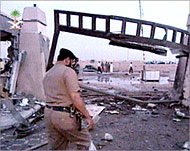World leaders condemn Saudi bomb attacks
Saudi Arabia has again led condemnation of the bombings this week of three expatriate compounds in the country’s capital, Riyadh.
|
|
|
The attacks left at least 34 dead |
Foreign Minister Prince Saud Al-Faisal vowed on Wednesday to find those behind attacks in Riyadh which killed at least 34 people and said the assailants would be sorry.
Other Arab officials decried the attacks as criminal. However, many said the fight against “terrorism” could start only after the resolution of the Palestinian-Israeli conflict.
Jordan, which lost five nationals in the attacks, said the key to uprooting such attacks was an end to the Palestinian-Israeli crisis.
Some countries said the bombings were in violation of Islam.
Iranian Foreign Minister Kamal Kharazi said there was no justification for the attacks. In a message addressed to his Saudi counterpart, Kharazi said “terrorism” could only increase tensions and hatred.
British Prime Minister Tony Blair condemned as “cowardly and disgraceful” the car bombings, which killed at least one Briton.
Leaders across Europe, Australia and Russia joined the chorus of condemnation for the attacks.
French President Jacques Chirac vowed to assist international partners in the “war against terror”.
The Vatican issued a statement calling on the international community to confront violence which threatened world peace.
Meanwhile, a former US diplomat said Washington’s invasion of Iraq had boosted the risk of similar attacks.
Robert Pelletreau served as Assistant Secretary of State for Near Eastern Affairs during the Clinton administration. He said in an interview published in Portugal that the US-led invasion had raised the risks because there was a lot of anger in the Arab world.
Palestinian President Yasser Arafat and Arab League Chief Amr Musa also condemned the attacks.
But Hamas official Abdel Aziz Al-Rantissi was quoted as saying the attacks “proved the prime enemy for the United States is its own policy”.
The Arab street echoed these sentiments. Ordinary citizens said attacks would likely continue unless Washington changed what is perceived in the Middle East as its biased policy in the region.
